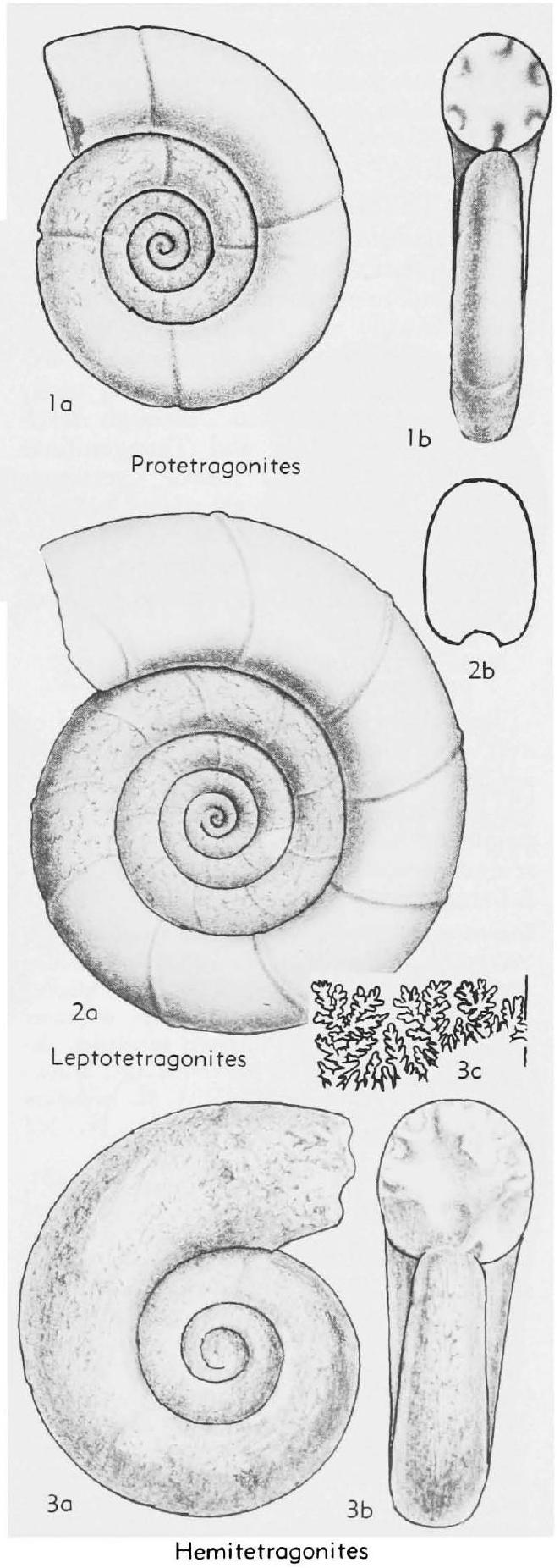Welcome to the Treatise on Invertebrate Paleontology!
Please enter a genera name to retrieve more information.

Protetragonites
Classification
Phylum:
Mollusca
Class:
Cephalopoda
Subclass:
Ammonoidea
Order:
Ceratitida
Suborder:
Lytoceratina
Superfamily:
Lytocerataceae
Family:
Lytoceratidae
Subfamily:
Protetragonitinae
Formal Genus Name and Reference:
Protetragonites HYATT, 1900
Type Species:
Ammonites quadrisculcatus D'ORBIGNY, 1840
Images
(Click to enlarge in a new window)
Fig. 229,1. *P. quadrisulcatus (Orb.), Valang., Fr., 1a,b, X1 (329*). Type species of Leptotetragonites (now synonym) = Fig. 229,2. *L. honnoratianus (Orb.), Valang., Fr., x0.75 (329*). Type species of Hemitetragonites (now synonym) = Fig. 229,3. *H. crebrisulcatus (Uhlig), Barrem., Aus., 3 a-c, X1 (530*)
Synonyms
Hemitetragonites, Leptotetragonites
Geographic Distribution
Eu.
Age Range
Beginning Stage in Treatise Usage:
U.Jur. (U.Tithon.)
Beginning International Stage:
Tithonian
Fraction Up In Beginning Stage:
70
Beginning Date:
144.94
Ending Stage in Treatise Usage:
L.Cret. (U. Alb.) upper range from 1996 Cret vol.
Ending International Stage:
Albian
Fraction Up In Ending Stage:
100
Ending Date:
100.5
Description
Very evolute, with circular to oval whorl section and regular radial straight or slightly curved constrictions; test smooth or with fine gowth lines only. Suture with a ten- dency to develop one or more auxiliaries. Whorl section circular, constrictions few, straight to slightly curved. [Probably derived from Lytoceras (s.s.), young whorls of which commonly have a few strong constrictions, as in Protetragonites] [The current synonyms of Hemitetragonites (Whorl section more or less round but tending to be slightly flattened on sides and venter, constrictions straight or slightly curved; Hauteriv.-M.Alb. / Fr.-C.Eu.-Madag..) and Leptotetragonites (Section compressed oval, 10 or more constrictions to whorl, with strong, rounded rib in front; Berrias.-Valang. / Fr.) were separate genera in the 1957 volume under a Protetragonitidae family, but reclassified in the 1996 Cretaceous update. In addition, Protetragonites was no longer assigned as a seperate family, but merged under Subfamily Lytoceratinae; but it is retained as a separate sub-family under family Lytoceratidae here.]
References
Hyatt, Alpheus, 1900, Cephalopoda: in Zittel, K. A., Textbook of Palaeontology, 1st English ed., transl. Eastman, C. R., p. 502-592, fig. 1049-1235.
Museum or Author Information
Classification
Phylum:
Mollusca
Class:
Cephalopoda
Subclass:
Ammonoidea
Order:
Ceratitida
Suborder:
Lytoceratina
Superfamily:
Lytocerataceae
Family:
Lytoceratidae
Subfamily:
Protetragonitinae
Formal Genus Name and Reference:
Protetragonites HYATT, 1900
Type Species:
Ammonites quadrisculcatus D'ORBIGNY, 1840
Images
(Click to enlarge in a new window)
Fig. 229,1. *P. quadrisulcatus (Orb.), Valang., Fr., 1a,b, X1 (329*). Type species of Leptotetragonites (now synonym) = Fig. 229,2. *L. honnoratianus (Orb.), Valang., Fr., x0.75 (329*). Type species of Hemitetragonites (now synonym) = Fig. 229,3. *H. crebrisulcatus (Uhlig), Barrem., Aus., 3 a-c, X1 (530*)
Synonyms
Hemitetragonites, Leptotetragonites
Geographic Distribution
Eu.
Age Range
Beginning Stage in Treatise Usage:
U.Jur. (U.Tithon.)
Beginning International Stage:
Tithonian
Fraction Up In Beginning Stage:
70
Beginning Date:
144.94
Ending Stage in Treatise Usage:
L.Cret. (U. Alb.) upper range from 1996 Cret vol.
Ending International Stage:
Albian
Fraction Up In Ending Stage:
100
Ending Date:
100.5
Description
Very evolute, with circular to oval whorl section and regular radial straight or slightly curved constrictions; test smooth or with fine gowth lines only. Suture with a ten- dency to develop one or more auxiliaries. Whorl section circular, constrictions few, straight to slightly curved. [Probably derived from Lytoceras (s.s.), young whorls of which commonly have a few strong constrictions, as in Protetragonites] [The current synonyms of Hemitetragonites (Whorl section more or less round but tending to be slightly flattened on sides and venter, constrictions straight or slightly curved; Hauteriv.-M.Alb. / Fr.-C.Eu.-Madag..) and Leptotetragonites (Section compressed oval, 10 or more constrictions to whorl, with strong, rounded rib in front; Berrias.-Valang. / Fr.) were separate genera in the 1957 volume under a Protetragonitidae family, but reclassified in the 1996 Cretaceous update. In addition, Protetragonites was no longer assigned as a seperate family, but merged under Subfamily Lytoceratinae; but it is retained as a separate sub-family under family Lytoceratidae here.]
References
Hyatt, Alpheus, 1900, Cephalopoda: in Zittel, K. A., Textbook of Palaeontology, 1st English ed., transl. Eastman, C. R., p. 502-592, fig. 1049-1235.
